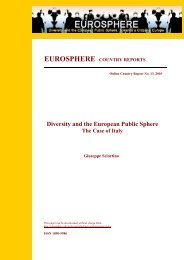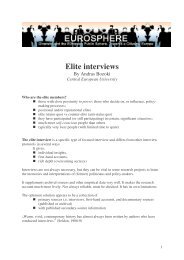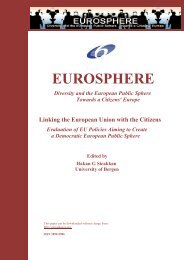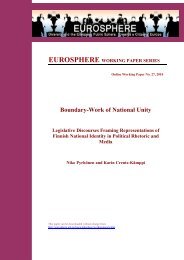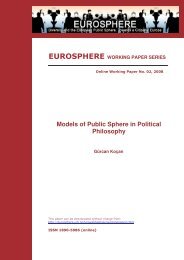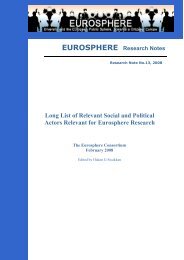Migrants, Minorities, Belongings and Citizenship. Glocalization and ...
Migrants, Minorities, Belongings and Citizenship. Glocalization and ...
Migrants, Minorities, Belongings and Citizenship. Glocalization and ...
Create successful ePaper yourself
Turn your PDF publications into a flip-book with our unique Google optimized e-Paper software.
versa, the selection of cases comprises countries with different degrees of association<br />
with the Union. In this respect, the selected cases represent Member States (Austria,<br />
Denmark, Finl<strong>and</strong>), associated countries with a high degree of integration (e.g. Norway),<br />
c<strong>and</strong>idate countries with a fairly good degree of integration (e.g. Hungary), <strong>and</strong><br />
c<strong>and</strong>idate countries with a lower degree of integration (e.g. Estonia). Moreover, the<br />
selection of countries also reflects the temporal dimension of integration in terms of early<br />
<strong>and</strong> late start of integration, specifically with respect to the distinction between West<br />
European <strong>and</strong> previously communistic countries. This also relates to issues around the<br />
European Union’s extension process.<br />
In comparing small member states with small non-member states, one aim is to discuss<br />
how the change in the meaning <strong>and</strong> practice of citizenship has evolved through increased<br />
mobility rights within the EU, <strong>and</strong> whether Union membership may lead to changes in<br />
any direction. In this respect, the comparative frame will also assess whether the<br />
developments on the policy level support the EU’s principles of functional equivalence<br />
<strong>and</strong> subsidiarity or the principle of differentiated scale of rights. Issues related to the<br />
Sami concerns, the status of extra-territorial citizens (Svalbard, Al<strong>and</strong> Isl<strong>and</strong>s, Faroe<br />
Isl<strong>and</strong>s, <strong>and</strong> Greenl<strong>and</strong>), <strong>and</strong> second country nationals as well receive a significantly<br />
greater attention in this connection, <strong>and</strong> the policy developments here will reflect how a<br />
country has to achieve a congruency in its citizenship st<strong>and</strong>ards.<br />
With respect to the goal of testing the utility of our qualitative-comparative analysis<br />
toolkit (QC-CITKIT) <strong>and</strong> our qualitative-comparative measurement tools (QC-CITSCALE),<br />
<strong>and</strong> forming a small states citizenship conditions database (QC-CITBASE), this selection<br />
of countries will help identify certain important types of misalignments between<br />
belongings <strong>and</strong> citizenship in the context of European peripheries as well as the best<br />
functioning participation <strong>and</strong> voice models.<br />
26



